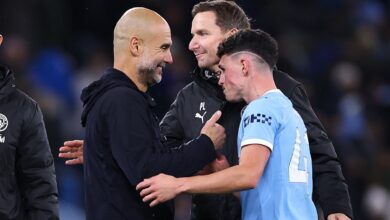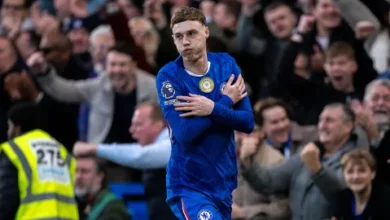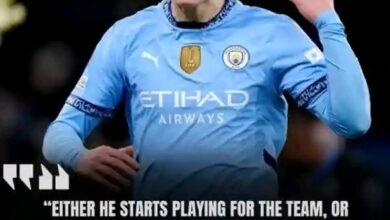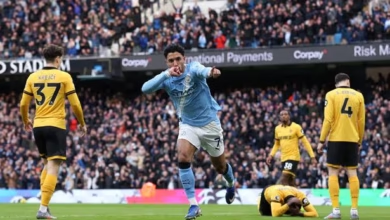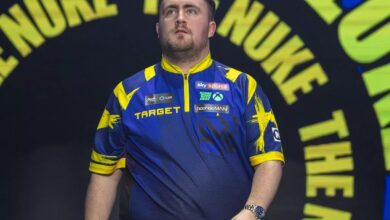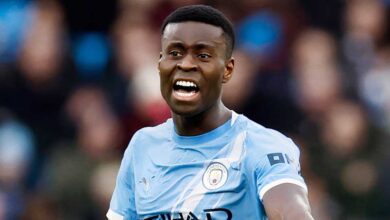Man City ‘willing to pay £147m’ to sign Chelsea star who is wanted by PSG and Real Madrid

The reports suggesting Manchester City’s willingness to pay £147 million to re-sign Cole Palmer represent one of the most extraordinary potential transfer scenarios in recent memory. The prospect of a club paying such a substantial fee to reacquire a player they sold for less than a third of that amount just two years earlier would set unprecedented precedents in the transfer market and raise fundamental questions about long-term planning and player evaluation at the highest level.
According to Fichajes, Pep Guardiola has maintained his admiration for Palmer’s talent despite the player’s departure and is now determined to bring him back to Manchester “at all costs.” This reported stance suggests that City’s initial decision to allow Palmer’s departure may have been influenced by short-term squad considerations rather than a comprehensive assessment of his long-term potential. The manager’s apparent eagerness to reverse this decision indicates recognition that the club may have made a significant error in judgment regarding one of their most promising academy graduates.
The proposed £147 million fee would represent a British transfer record, surpassing previous benchmarks and establishing new parameters for the valuation of elite attacking talent. More significantly for Chelsea, such a fee would generate over £100 million in pure profit on their initial investment, creating substantial room for maneuver in their own transfer activities and potentially enabling a complete squad overhaul across multiple positions.
From Manchester City’s perspective, the pursuit of Palmer can be understood within the context of their current squad evolution. The departure of Kevin De Bruyne has created a void in their attacking midfield structure that requires a player of exceptional technical ability and creative vision to fill effectively. Palmer’s profile as a natural replacement for the Belgian maestro makes tactical sense, offering similar creative output while bringing youth and long-term potential to the position.
The timing of this reported interest coincides with City’s broader squad renovation project. The arrivals of Tijjani Reijnders and Rayan Cherki, combined with Rodri’s return from injury, demonstrate the club’s commitment to refreshing their midfield options. However, Palmer would represent the marquee signing that could define this reconstruction phase, bringing both immediate impact and long-term security to a crucial position in Guardiola’s tactical system.
The psychological aspect of this potential transfer cannot be overlooked. For Palmer, a return to Manchester City would represent a full-circle moment in his career, offering the opportunity to prove himself at the club where his professional journey began. The validation of being pursued so aggressively by his former employers could provide additional motivation, while the familiarity with City’s tactical system and training methods might facilitate a smoother integration process.
The European Elite Competition
Palmer’s emergence as a transfer target has attracted interest from across Europe’s footballing aristocracy, with Paris Saint-Germain and Real Madrid reportedly joining the pursuit alongside Manchester City. This level of interest from multiple elite institutions reflects the consensus view that Palmer represents one of the most valuable young attacking talents in world football, capable of making an immediate impact at the highest level of competition.
Paris Saint-Germain’s reported readiness to offer a package worth more than £200 million demonstrates the French champions’ determination to secure Palmer’s signature. This valuation, if accurate, would establish new benchmarks for player valuations and reflect PSG’s assessment that Palmer represents a generational talent capable of anchoring their attacking play for the next decade. The club’s recent strategic shift toward building around younger, more developable talents makes Palmer an ideal target for their long-term vision.
The French club’s financial resources enable them to compete with any potential rival for Palmer’s signature, while their recent Champions League success provides the sporting prestige that ambitious players seek. The opportunity to play alongside world-class talents in a club committed to European success represents a compelling proposition for any young player seeking to establish himself among football’s elite.
Real Madrid’s interest adds another dimension to the competition for Palmer’s services. The Spanish giants’ reputation for identifying and developing the world’s best attacking talents makes their pursuit particularly significant. Their track record of providing platforms for players to achieve individual and collective success at the highest level could prove decisive in any potential negotiation.
The timing of Real Madrid’s interest, reportedly intensifying after Palmer’s Club World Cup final performance, suggests that their scouting network has identified specific qualities that align with their tactical requirements and long-term planning. The club’s ability to offer Champions League football at the highest level, combined with their global profile and commercial opportunities, positions them as formidable competitors in any bidding scenario.
The competition between these elite institutions creates a fascinating dynamic that extends beyond simple financial considerations. Each club offers unique advantages in terms of playing style, development opportunities, and career trajectory possibilities. Palmer’s eventual decision, should he become available, would likely depend on factors including guaranteed playing time, tactical fit, and personal ambitions regarding individual and team success.
Chelsea’s Strategic Position
Chelsea’s position in this developing transfer saga is particularly intriguing given their initial investment in Palmer and the remarkable return they now face on that decision. The club’s strategic thinking regarding Palmer’s future will likely involve complex calculations about short-term competitive needs versus long-term financial opportunities.
Palmer’s contract extension last summer, which keeps him at Stamford Bridge until 2033, provides Chelsea with significant leverage in any potential negotiations. The length of this deal enables the club to demand premium valuations while providing security against unwanted departures. This contractual position transforms what might otherwise be a vulnerable situation into one where Chelsea holds considerable negotiating power.
The financial implications of a potential Palmer sale are substantial for Chelsea’s broader transfer strategy. The profit generated from such a transaction would provide unprecedented resources for squad renovation, potentially enabling the club to address multiple positional needs simultaneously. However, this financial opportunity must be weighed against the sporting impact of losing one of their most productive and consistent performers.
From a tactical perspective, Palmer’s role in Chelsea’s system has evolved to the point where he has become integral to their attacking structure. His ability to create chances, score goals, and provide tactical flexibility across multiple positions makes him extremely difficult to replace. Any potential departure would require careful planning to ensure that alternative solutions can provide similar levels of productivity and tactical versatility.
The club’s recent investment in Palmer, both in terms of transfer fee and contract extension, suggests a long-term commitment to building around his talents. This strategic direction would be fundamentally altered by his departure, potentially requiring a complete reassessment of tactical approach and squad composition. The decision to entertain offers, regardless of their size, would represent a significant shift in the club’s strategic thinking.
Chelsea’s recent history with high-profile departures provides context for how they might approach this situation. The club has demonstrated willingness to accept substantial offers for key players when the financial and strategic conditions align favorably. However, Palmer’s unique combination of age, productivity, and potential makes his situation distinct from previous transfer scenarios.
Financial Market Implications
The valuations being discussed for Palmer represent a significant escalation in the transfer market, particularly for players who have yet to establish themselves in European competition’s highest tiers. The proposed fees reflect broader trends in football economics, where clubs increasingly view young, productive players as appreciating assets worthy of substantial investment.
The £147 million figure mentioned in connection with Manchester City’s interest would establish new benchmarks for British transfer records, surpassing previous standards and creating new expectations for similar player profiles. This escalation reflects the increased financial resources available to elite clubs and their willingness to invest heavily in players who offer both immediate impact and long-term potential.
From an economic perspective, Palmer’s situation illustrates the potential returns available from astute recruitment in the current market environment. Chelsea’s initial £42.5 million investment has potentially appreciated to more than triple its original value within two years, demonstrating the extraordinary returns possible when talent identification and development align successfully.
The competitive bidding scenario between multiple elite clubs creates ideal conditions for maximum value realization. The involvement of financially powerful institutions like PSG, Real Madrid, and Manchester City ensures that any eventual transfer fee will reflect Palmer’s full market value, potentially establishing new precedents for similar transactions.
The broader implications for the transfer market could be substantial if these valuations are realized. Other clubs may adjust their own player valuations upward in response to new market benchmarks, potentially creating inflationary pressures across the entire elite transfer ecosystem. This dynamic could benefit selling clubs while increasing the costs associated with squad improvement for purchasing institutions.
Tactical Analysis and System Fit
Palmer’s tactical profile makes him an attractive option for multiple elite clubs, each of whom could utilize his skills within their specific tactical frameworks. His versatility across attacking positions provides strategic flexibility that modern coaches increasingly value, while his technical excellence and decision-making ability enable him to adapt to different playing styles and tactical requirements.
In Manchester City’s system under Pep Guardiola, Palmer would likely operate as a central attacking midfielder, filling the void left by Kevin De Bruyne’s departure. His ability to create chances through precise passing, combined with his goal-scoring threat from advanced positions, aligns perfectly with the requirements of this role within City’s possession-based approach. His previous familiarity with Guardiola’s tactical methods would facilitate integration, while his development since leaving the club would bring enhanced maturity and consistency to his contributions.
For Paris Saint-Germain, Palmer’s profile fits their evolving tactical approach under their current management structure. His ability to operate across multiple attacking positions would provide tactical flexibility, while his creativity and goal-scoring threat would enhance their offensive options in both domestic and European competitions. The French club’s commitment to attacking football makes Palmer’s skill set particularly valuable within their strategic framework.
Real Madrid’s interest in Palmer reflects their assessment that his attributes align with their tactical requirements and long-term planning. His creativity, technical ability, and goal-scoring threat from midfield positions would enhance their attacking options, while his age profile fits their preference for players who can contribute immediately while offering long-term potential.
The tactical analysis extends beyond individual skills to encompass Palmer’s understanding of game situations and his ability to influence matches during crucial moments. His performance in high-pressure situations, exemplified by his Club World Cup final display, demonstrates the mental strength and competitive instinct that elite clubs seek in their key players.
Expert Opinion and Industry Assessment
Jody Morris’s assessment of Palmer as a “superstar” who still has “another level to go” provides expert insight into the player’s current status and future potential. Morris’s background as both a former Chelsea academy coach and assistant manager gives his opinion particular credibility, as he has observed Palmer’s development from close proximity and understands the specific qualities that distinguish elite-level talents.
The comparison to Eden Hazard represents high praise indeed, given the Belgian’s status as one of the Premier League’s greatest ever attacking players during his time at Chelsea. Morris’s suggestion that Palmer operates “in that same bracket” indicates his belief that the English international possesses the rare combination of technical ability, creativity, and match-winning capability that defines truly exceptional attacking talents.
Morris’s observation that Palmer needs Champions League experience to reach “the next level” provides context for understanding why Europe’s elite clubs are pursuing him so aggressively. The opportunity to compete in European football’s premier competition represents both a development opportunity for Palmer and a showcase for his talents on the global stage.
The expert assessment extends beyond individual technical abilities to encompass Palmer’s mental approach and leadership qualities. His willingness to “take it upon himself” to influence crucial matches demonstrates the psychological strength and competitive mentality that separates good players from great ones. This characteristic becomes particularly valuable in high-pressure situations where individual brilliance can determine collective success.
Industry observers have noted Palmer’s remarkable consistency since joining Chelsea, highlighting his ability to maintain high performance levels across different competitions and against varying levels of opposition. This reliability represents a crucial factor in transfer valuations, as clubs increasingly prioritize players who can deliver consistent contributions rather than sporadic moments of brilliance.
Long-term Career Implications
The transfer speculation surrounding Palmer occurs at a crucial juncture in his career development, where the decisions made in the coming months could fundamentally shape his long-term trajectory in the sport. The opportunity to join one of Europe’s elite institutions would provide access to the highest levels of competition while potentially accelerating his development through exposure to world-class teammates and coaching.
From a personal development perspective, Palmer’s situation presents both opportunities and risks. A move to Manchester City would offer familiar surroundings and tactical systems, potentially facilitating immediate success while providing validation of his development since leaving the club. However, the pressure to justify such a substantial transfer fee could create additional mental challenges that might impact his performance and enjoyment of the game.
The alternative of remaining at Chelsea offers different advantages, including continued guaranteed playing time and the opportunity to establish himself as a club legend through sustained success. The security of his long-term contract provides financial stability while allowing focus on football development without the distractions associated with constant speculation about his future.
The Champions League factor mentioned by Morris becomes particularly relevant when considering Palmer’s long-term ambitions. Success in European competition represents the ultimate validation for elite players, and his choice of club could significantly impact his ability to achieve this goal. The competitive strength and European pedigree of his potential destinations will likely factor heavily in any decision-making process.
The international implications of Palmer’s club choice should also be considered. His continued development and success at club level directly impacts his status within the England national team setup, where competition for attacking positions remains intense. The visibility and prestige associated with playing for elite European clubs could enhance his international prospects while providing platforms for showcasing his talents on the global stage.
Conclusion: A Defining Moment in Modern Football
The Cole Palmer transfer saga represents more than just another high-profile player movement; it encapsulates many of the defining characteristics of modern football’s transfer ecosystem. The astronomical valuations, the competition between global footballing superpowers, and the complex interplay of sporting and financial considerations all combine to create a narrative that extends far beyond the individual player involved.
The potential for Manchester City to pay £147 million to reacquire a player they sold for £42.5 million two years earlier would represent an unprecedented admission of miscalculation, while simultaneously demonstrating the club’s willingness to rectify perceived errors regardless of cost. This scenario highlights the increasingly high-stakes nature of talent evaluation and the substantial consequences of both successful and unsuccessful recruitment decisions.
For Palmer himself, the situation represents the ultimate validation of his decision to leave Manchester City in search of regular playing time. His transformation from fringe player to one of Europe’s most sought-after talents demonstrates the importance of opportunity in player development and the sometimes unpredictable nature of football careers.
The resolution of this transfer saga will likely establish new precedents for player valuations while providing insights into the strategic priorities of Europe’s elite clubs. Whether Palmer r






